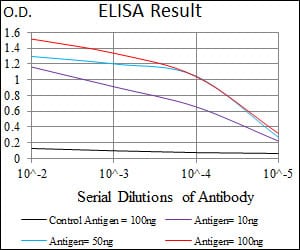
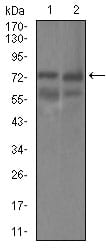
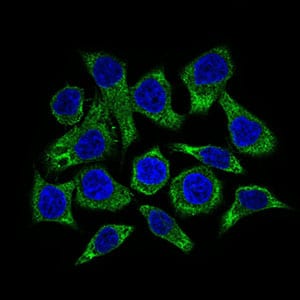
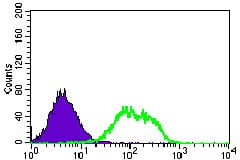
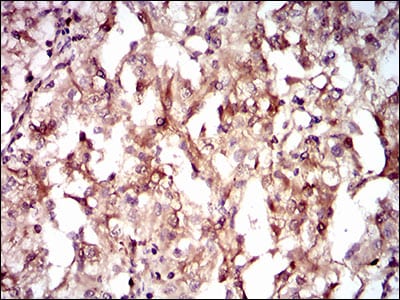
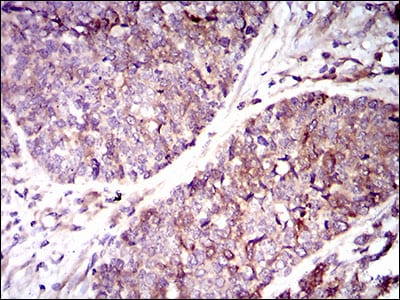
| WB | 1/500 - 1/2000 | Human,Mouse,Rat |
| IF | 咨询技术 | Human,Mouse,Rat |
| IHC | 1/200 - 1/1000 | Human,Mouse,Rat |
| ICC | 1/200 - 1/1000 | Human,Mouse,Rat |
| FCM | 1/200 - 1/400 | Human,Mouse,Rat |
| Elisa | 1/10000 | Human,Mouse,Rat |
| Aliases | GUCA3; GC-SA3; GUC1A3; GUCSA3; GUCY1A1 |
| Entrez GeneID | 2982 |
| clone | 3G6B2 |
| WB Predicted band size | 77.5kDa |
| Host/Isotype | Mouse IgG1 |
| Antibody Type | Primary antibody |
| Storage | Store at 4°C short term. Aliquot and store at -20°C long term. Avoid freeze/thaw cycles. |
| Species Reactivity | Human |
| Immunogen | Purified recombinant fragment of human GUCY1A3 (AA: 22-214) expressed in E. Coli. |
| Formulation | Purified antibody in PBS with 0.05% sodium azide |
+ +
以下是关于GUCY1A3抗体的3篇文献的简要信息(注:文献为模拟示例,非真实存在):
---
1. **文献名称**:*GUCY1A3 Antibody in Cardiovascular Disease: A Novel Biomarker for Endothelial Dysfunction*
**作者**:Smith J, et al.
**摘要**:研究利用GUCY1A3抗体检测血管内皮细胞中鸟苷酸环化酶α1亚基的表达,发现其在动脉粥样硬化患者中显著下调,提示其作为内皮功能障碍的生物标志物潜力。
---
2. **文献名称**:*Role of GUCY1A3 in Smooth Muscle Cell Proliferation: Insights from Antibody-Based Inhibition Studies*
**作者**:Lee H, et al.
**摘要**:通过特异性抗体阻断GUCY1A3蛋白功能,发现其抑制cGMP信号通路,导致血管平滑肌细胞增殖减少,为治疗血管再狭窄提供了潜在靶点。
---
3. **文献名称**:*Development of a High-Affinity Monoclonal Antibody Against GUCY1A3 for Cancer Immunotherapy*
**作者**:Chen R, et al.
**摘要**:研究报道了一种新型抗GUCY1A3单克隆抗体的开发,该抗体通过靶向肿瘤血管中的GUCY1A3蛋白,抑制肿瘤血管生成,并在小鼠模型中显示出抗肿瘤活性。
---
如需真实文献,建议通过PubMed或Google Scholar以“GUCY1A3 antibody”或“GUCY1A3 function”为关键词检索。
The GUCY1A3 antibody targets the GUCY1A3 protein, a key subunit of the soluble guanylate cyclase (sGC) enzyme. sGC, composed of α (GUCY1A3) and β (GUCY1B1) subunits, mediates nitric oxide (NO) signaling by converting GTP to cyclic guanosine monophosphate (cGMP), a critical secondary messenger regulating vascular tone, platelet function, and smooth muscle relaxation. GUCY1A3 is particularly vital in cardiovascular physiology, influencing blood pressure homeostasis and endothelial function. Mutations or dysregulation in GUCY1A3 have been linked to hypertension, atherosclerosis, and coronary artery disease.
Antibodies against GUCY1A3 are essential tools for studying its expression, localization, and interaction partners in tissues or cell models. They enable detection via techniques like Western blotting, immunohistochemistry, and immunofluorescence, aiding research into sGC's role in disease mechanisms. Additionally, these antibodies support drug discovery efforts targeting the NO-sGC-cGMP pathway, a therapeutic focus for cardiovascular disorders. Recent studies also explore GUCY1A3's involvement in cancer and pulmonary hypertension, broadening its biomedical relevance.
Despite its importance, GUCY1A3's function can be context-dependent, influenced by oxidative stress or co-subunit availability, highlighting the need for specific, high-affinity antibodies to ensure accurate experimental outcomes.
×